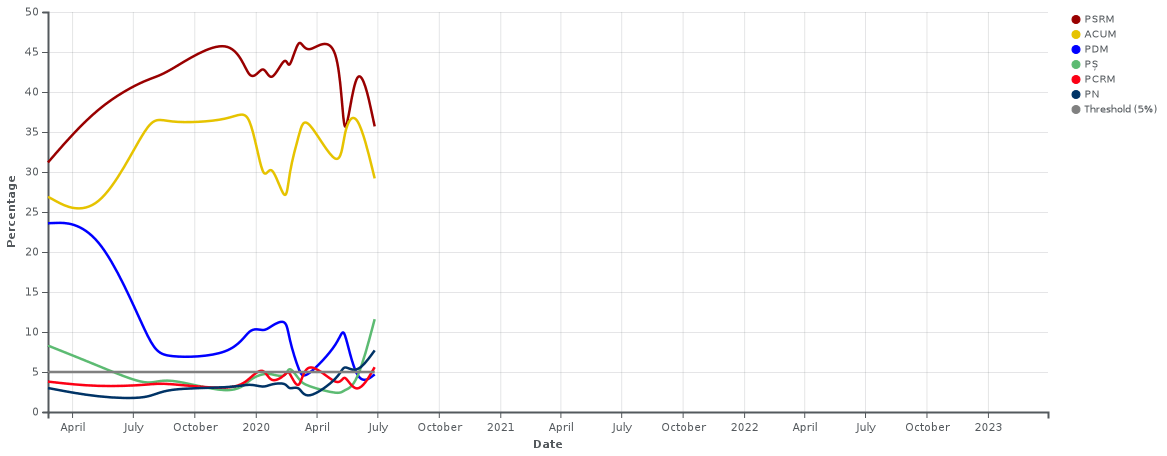Next Moldovan parliamentary election
The next parliamentary elections in Moldova must be held by 2023. Amidst a constitutional crisis in June 2019, parliamentary elections were called for 6 September 2019 by Pavel Filip after he was appointed acting president due to Igor Dodon's temporary suspension from office. However, Filip later stepped down.
| ||||||||||||||||||||||||||||||||||||||||||||||||||
All 101 seats in Parliament 51 seats needed for a majority | ||||||||||||||||||||||||||||||||||||||||||||||||||
|---|---|---|---|---|---|---|---|---|---|---|---|---|---|---|---|---|---|---|---|---|---|---|---|---|---|---|---|---|---|---|---|---|---|---|---|---|---|---|---|---|---|---|---|---|---|---|---|---|---|---|
| Opinion polls | ||||||||||||||||||||||||||||||||||||||||||||||||||
| ||||||||||||||||||||||||||||||||||||||||||||||||||
| ||||||||||||||||||||||||||||||||||||||||||||||||||
 |
|---|
| This article is part of a series on the politics and government of Moldova |
|
Judiciary |
| Administrative divisions |
|
|
|
Background
The Constitution of Moldova mandates that a government must be formed within three months of official results of parliamentary elections being proclaimed by the Constitutional Court. The results of the 24 February elections were confirmed on 9 March. On 8 June a coalition government led by Maia Sandu was formed by the Party of Socialists (PSRM) and the ACUM alliance. However, the Democratic Party (PDM) petitioned the Supreme Court, claiming that the government had not been formed in time. The Court interpreted the three-month deadline as 90 days, which meant the deadline had been 7 June, and concluded that snap elections should be held. The following day the Court suspended President Igor Dodon (a former PSRM leader) from exercising his presidential powers and duties for failing to dissolve parliament, and appointed former prime minister Pavel Filip of the PDM as acting president. Filip subsequently issued a decree calling for early elections for 6 September.[1]
Dodon and the PSRM–ACUM coalition called the process illegal. The governments of Russia, France, Germany, Poland, Sweden and the United Kingdom all recognised the newly-formed Sandu cabinet as the legitimate government. On 14 June Filip stepped down and allowed the PSRM–ACUM government to take office.
Electoral system
The 101 seats in the Parliament are elected using a parallel voting system introduced in 2017; 50 MPs are elected by proportional representation in a single nationwide constituency, with the other 51 elected from single-member constituencies.[2][3]
For the nationwide constituency, the electoral threshold varies depending on the type of list; for single parties or organisations it is 6%; for alliances of two parties it is 9%, and for alliances of three or more parties it is 11%. For independent candidates the threshold is 2%[4]
Opinion polls

References
- Snap elections called as Moldova crisis escalates BBC News, 9 June 2019
- "Hundreds Protest In Moldova Against New Electoral Law". RadioFreeEurope/RadioLiberty. Retrieved 2019-01-11.
- "New Electoral Law in Moldova Criticised as a Tool to Keep Power". Archived from the original on 2017-09-18. Retrieved 2019-06-10.
- Electoral system IPU
.jpg)
_cropped.jpg)
_(cropped).jpg)